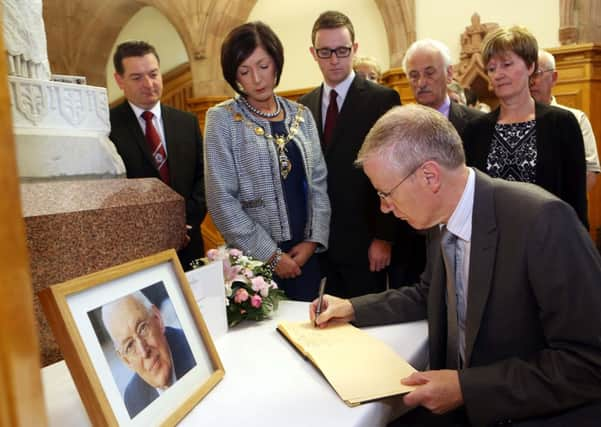MP Campbell: Paisley’s passing ‘the end of an era’


The MP said: “I count it one of the privileges of my life to have known Ian Paisley as well as I did over such a long period. His passing last week meant the end of an era. Already there have been numerous attempts to re write his life even in the short time that has elapsed since his death.
“He was a man steeped in history, both church history and political history.
Advertisement
Hide AdAdvertisement
Hide Ad“He had a massive personal library, he would come back from a summer break spent in bookshops and returned with dozens of second hand books, mostly puritan, some political. To understand him, we need to know the history.
“On political issues his view was that the Protestant people in Ireland historically were under threat, he had read of the massacre of Protestants in 1641, the great siege of Londonderry in 1689, the setting up of the Northern Ireland State in 1921 and the attitude to it both by the Republic, and a number of Nationalists within Northern Ireland’s boundaries etc. this all ensured that the so called ‘siege mentality’ was alive and well not just in the mind of Ian Paisley but in the minds of hundreds of thousands of Ulster Protestants he came to represent, and for very good reason given those historical events.
“The context of physical insecurity and of religious persecution framed not just the man but the community he was born into. When the failed IRA campaign of 1956 - 62 was still very fresh in the memory and there was the outbreak of protest and violence in 1969/70 there was no doubt in his mind that Ulster had to be defended.
“Aggressive violence by Irish Republicans and a weak response by Unionists had to be confronted and replaced by stronger opposition. Once this context is understood then people should be able to comprehend Ian Paisley’s motivation. He knew that there would have to be an accommodation at some time, but it had to be the right one. Some say why couldn’t he have settled earlier, for example in 1974 when there was a power sharing experiment? They overlook the fact that the IRA were still actively murdering, and just two years earlier there had been the highest death tally in the troubles, nearly 500 people murdered in a single year, and the IRA were adamantly opposed to Sunningdale in 1974. For him terror had to be defeated not appeased.
Advertisement
Hide AdAdvertisement
Hide Ad“Political talks were another area where Ian Paisley was misunderstood. From 1979 through to the mid 1990’s Ian Paisley, far from being opposed to talking actually was involved in each series of talks that were held.
“It’s not a case of Bad Paisley then, Good Paisley now. He was determined that he would never sign up to a bad deal but was prepared to get a good one. While the IRA remained active and killing people he would not contemplate their inclusion in discussions. When they finally realised they couldn’t defeat the democratically expressed will of the people and ceased their violence he then demanded that their political apologists in SF supported the Rule of Law and the Police. Once these things were in place Paisley was up for the deal. It really was a case of, “To get the right answer, try asking the right question” for Ian Paisley
“His Protestant convictions never wavered. His preaching of Christ Crucified as the only way to Heaven was in keeping with many great gospel preachers down through the centuries. Doc. I salute you, you were indeed, the Big Man. In the words of the great hymn you loved to lead people in singing, it is a case of ‘Till we meet again, God be with you till we meet again’.”